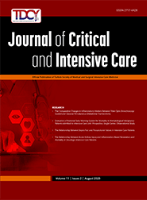
Journal of Critical & Intensive Care
Scope & Guideline
Bridging gaps in critical care with impactful research.
Introduction
Aims and Scopes
- Clinical Outcomes and Predictive Analytics:
Research focusing on clinical outcomes for critically ill patients, including the use of predictive modeling and machine learning to forecast mortality and complications in intensive care units (ICUs). - Infectious Diseases and Sepsis Management:
A strong emphasis on the management and outcomes related to infectious diseases, particularly sepsis, with studies exploring biomarkers, treatment protocols, and patient demographics. - Mechanical Ventilation and Respiratory Support:
Investigations into mechanical ventilation strategies, including the use of automated modes and interventions for patients with acute respiratory distress syndrome (ARDS) and chronic obstructive pulmonary disease (COPD). - Multidisciplinary Approaches in Critical Care:
Research that integrates various specialties such as nephrology, cardiology, and infectious disease into critical care, highlighting the collaborative nature of modern intensive care treatment. - Technological Innovations in Intensive Care:
Exploration of new technologies and methodologies in critical care, including the application of machine learning and automated systems to improve patient outcomes.
Trending and Emerging
- Machine Learning and Predictive Analytics:
A significant increase in studies utilizing machine learning for predicting outcomes in critically ill patients, emphasizing the role of data analytics in enhancing clinical decision-making. - COVID-19 Related Research:
A notable surge in research related to COVID-19, particularly concerning its impact on ICU management, treatment protocols, and long-term outcomes for survivors, reflecting the ongoing relevance of the pandemic in critical care. - Sepsis and Its Biomarkers:
An emerging focus on sepsis, particularly in relation to biomarkers and genetic predispositions, indicates a growing interest in understanding the underlying mechanisms and improving management strategies. - Innovative Respiratory Support Techniques:
Research into innovative techniques for respiratory support, including non-invasive ventilation and advanced mechanical ventilation strategies, is trending, driven by the need to improve outcomes in respiratory failure. - Patient-Centered Care Approaches:
Increasing attention to patient-centered care approaches in critical settings, highlighting the importance of considering patient preferences and outcomes in treatment plans.
Declining or Waning
- Traditional Pharmacological Interventions:
Research on traditional pharmacological treatments for critical illnesses appears to be decreasing, as newer, more innovative treatment modalities gain attention, such as personalized medicine and technology-driven solutions. - Generalized ICU Protocols without Specificity:
There is a noticeable decline in studies that focus on broad, generalized ICU protocols without specific disease or condition focus, as the trend shifts towards more tailored and individualized approaches to patient management. - Longitudinal Studies with Limited Scope:
Longitudinal studies that do not incorporate emerging technologies or multidisciplinary approaches are becoming less common, indicating a shift towards more dynamic and integrated research methodologies.
Similar Journals
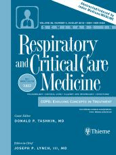
SEMINARS IN RESPIRATORY AND CRITICAL CARE MEDICINE
Fostering Excellence in Critical Care Insights.SEMINARS IN RESPIRATORY AND CRITICAL CARE MEDICINE is a leading journal published by THIEME MEDICAL PUBL INC, dedicated to advancing knowledge in the fields of respiratory and critical care medicine. Established in 1994, this esteemed publication has consistently provided a platform for researchers, healthcare professionals, and students to explore cutting-edge findings and comprehensive reviews encompassing both critical care and pulmonary domains. With a commendable impact factor and a 2023 ranking in the Q1 quartile for Critical Care and Intensive Care Medicine, as well as Q2 in Pulmonary and Respiratory Medicine, the journal stands out for its rigorous peer-review process and high-quality content. Although it does not operate under an open access model, its accessibility to various academic institutions ensures a broad reach across the medical community. By disseminating significant research, clinical insights, and critical updates, SEMINARS IN RESPIRATORY AND CRITICAL CARE MEDICINE serves as an essential resource for those aiming to stay at the forefront of their disciplines and enhance patient care outcomes.
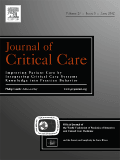
JOURNAL OF CRITICAL CARE
Shaping the Future of Intensive Care Through ScholarshipJOURNAL OF CRITICAL CARE, published by W B SAUNDERS CO-ELSEVIER INC, is a prestigious peer-reviewed journal in the field of critical care and intensive care medicine. With an impressive Q1 classification in 2023, it stands as a leading publication among its peers, ranking #12 out of 110 in the Scopus database, which places it in the 89th percentile of critical care-related journals. Established in 1986 and with a converged timeline extending to 2025, the journal serves as a critical resource for international researchers, healthcare professionals, and students dedicated to advancing practices and understanding within the realm of critical care. Although it does not offer Open Access, the journal provides high-quality, rigorously reviewed articles that address contemporary issues, innovative techniques, and groundbreaking research in critical care medicine. By fostering scholarly dialogue and disseminating new knowledge, the JOURNAL OF CRITICAL CARE is pivotal in shaping the future of intensive patient care and enhancing health outcomes.
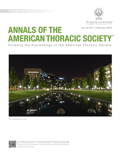
Annals of the American Thoracic Society
Connecting researchers and clinicians for a healthier tomorrow.Annals of the American Thoracic Society is a premier journal dedicated to advancing the field of pulmonary and respiratory medicine. Published by the American Thoracic Society, this journal offers an invaluable platform for researchers and clinicians to disseminate cutting-edge research, clinical insights, and innovative methodologies. With an impressive impact factor and ranked in the top Q1 category of its field (2023) and within the top 20 of 155 according to Scopus rankings, it is positioned as a leading force in shaping clinical practice and research directions. The journal's convergence years from 2013 to 2024 indicate a commitment to providing timely and relevant content at the forefront of pulmonary health. While not an open-access journal, it ensures broad accessibility to its significant contributions in respiratory medicine, making it an essential resource for professionals, researchers, and students alike endeavoring to deepen their understanding and improve outcomes in thoracic health.

Acute and Critical Care
Fostering global collaboration in critical care research.Acute and Critical Care is a leading open-access journal dedicated to the fields of critical care and intensive care medicine, published by the Korean Society of Critical Care Medicine. Since its inception in 2014, this journal has provided a platform for the dissemination of high-quality research, reviews, and innovative practices aimed at improving patient outcomes in acute medical situations. With an impressive Q2 ranking in both Critical Care and Intensive Care Medicine and in Critical Care Nursing for the year 2023, it is recognized as an influential source of knowledge among professionals in the field. The journal is indexed in Scopus, with notable rankings—7th out of 27 in Critical Care Nursing and 48th out of 110 in Critical Care and Intensive Care Medicine—highlighting its credibility and relevance. Situated in Seoul, South Korea, Acute and Critical Care aims to foster collaboration and engagement within the global community of researchers, presenting cutting-edge clinical applications and advancements in patient care.

Minerva Respiratory Medicine
Pioneering insights for a healthier breath.Minerva Respiratory Medicine is a prominent academic journal dedicated to advancing the field of pulmonary and respiratory medicine. Published by EDIZIONI MINERVA MEDICA in Italy, this journal provides a vital platform for the dissemination of innovative research, clinical studies, and review articles that address the complexities of respiratory health. With an ISSN of 2784-8477 and an E-ISSN of 2724-6493, it serves as an open-access resource, allowing researchers, healthcare professionals, and students access to invaluable information without barriers. The journal is categorized in the fourth quartile of the 2023 rankings in the field of pulmonary and respiratory medicine, indicating its emerging role in the academic landscape. Despite its nascent status—converging from 2021 to 2024—Minerva Respiratory Medicine is committed to enhancing knowledge and practice in respiratory care, focusing on both innovative therapies and traditional approaches. With its aim to foster collaboration and communication among professionals in the field, this journal is an essential resource for those passionate about improving respiratory health outcomes.
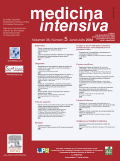
Medicina Intensiva
Advancing Critical Care Knowledge for Tomorrow's ChallengesMedicina Intensiva is a distinguished journal published by Elsevier España SLU, specializing in the critical care and intensive medicine fields. Since its inception in 1988, this peer-reviewed journal has established itself as a vital resource for healthcare professionals and researchers dedicated to advancing the knowledge and treatment of critically ill patients. With an impact factor ranked in the Q2 category for Critical Care and Intensive Care Medicine, the journal sits at the 50th percentile among its peers, reflecting its reputable standing in the academic community. The scope of the journal encompasses a wide array of topics, from clinical practices to innovative research findings, contributing significantly to the enhancement of patient care in intensive settings. Although the journal does not currently offer Open Access options, its valuable content is accessible to subscribers and institutions, reinforcing its role as an important conduit for disseminating high-quality research. As we continue into 2024, *Medicina Intensiva* remains committed to supporting the medical community through insightful articles and timely reviews that shape the future of intensive care.
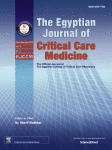
Egyptian Journal of Critical Care Medicine
Empowering Clinicians: Open Access to Critical InsightsEgyptian Journal of Critical Care Medicine, published by LIPPINCOTT WILLIAMS & WILKINS, serves as a vital resource in the field of critical care, providing a platform for innovative research and discussions that influence practice in intensive care settings. Established as an Open Access journal since 2013, it aims to disseminate high-quality research articles, clinical studies, and reviews that enhance understanding and application of critical care medicine. With an ISSN of 2090-7303 and an E-ISSN of 2090-9209, the journal is committed to ensuring that emerging insights and knowledge are freely available to a global audience, fostering collaboration among researchers, clinicians, and educators. Positioned within the landscape of critical care, the journal not only highlights the significance of patient management in life-threatening conditions but also promotes advancements in clinical protocols, making it essential reading for practitioners and scholars dedicated to enhancing patient outcomes in intensive care units.
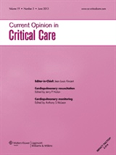
Current Opinion in Critical Care
Navigating the complexities of critical care practice.Current Opinion in Critical Care, published by Lippincott Williams & Wilkins, is a leading journal in the field of Critical Care and Intensive Care Medicine. With an ISSN of 1070-5295 and an E-ISSN of 1531-7072, this esteemed journal has been committed to disseminating high-quality and impactful research since its inception in 1996. The journal proudly ranks in the top quartile (Q1) of its category for 2023, affirming its position among the premier publications in critical care, with a Scopus ranking of #25 out of 110, placing it in the 77th percentile. Current Opinion in Critical Care offers essential insights, reviews, and discussions on the latest trends and best practices in the field, catering to the needs of researchers, clinicians, and students alike. Though it does not provide open access options, its contributions are pivotal in shaping patient care approaches and advancing clinical outcomes in critical care settings.

Canadian Journal of Respiratory Critical Care and Sleep Medicine
Advancing knowledge in respiratory and critical care.Welcome to the Canadian Journal of Respiratory Critical Care and Sleep Medicine, a prestigious peer-reviewed journal published by Taylor & Francis Inc. With an ISSN of 2474-5332 and an E-ISSN of 2474-5340, this journal serves as a vital platform for disseminating cutting-edge research in the fields of critical care, intensive care medicine, and pulmonary and respiratory medicine. Since its inception in 2017, the journal has established itself within the academic community, currently holding a Q2 ranking in Critical Care and Intensive Care Medicine and a Q3 ranking in Pulmonary and Respiratory Medicine for 2023. Although it operates under a standard access model, the journal remains committed to providing valuable insights and advancing knowledge through rigorous research articles, reviews, and case studies. Positioned in the heart of the United States, the journal aims to foster collaboration and innovation among healthcare professionals, researchers, and students dedicated to enhancing respiratory care and critical treatment protocols. Join us in exploring the dynamic intersection of research and practice that defines our mission.

Anesteziologie a Intenzivni Medicina
Advancing the Frontiers of Anesthesia and Critical CareAnesteziologie a Intenzivni Medicina is a pivotal Czech journal dedicated to the fields of anesthesiology, critical care, and intensive medicine. Published by SOLEN SRO, this journal plays a crucial role in disseminating essential research and advancements in these vital areas of medicine. With the ISSN 1214-2158 and E-ISSN 1805-4412, it has been in publication since 2003, showcasing a wealth of knowledge that is particularly relevant to the clinical practices in the Czech Republic and beyond. Although currently classified in the Q4 quartile for both anesthesiology and critical care disciplines, the journal is committed to fostering high-quality research and clinical discussions. Researchers and healthcare professionals can benefit from its content that encompasses various aspects of patient care and procedural developments. This journal is a valuable resource for those aiming to stay updated within the fast-evolving landscape of anesthesiology and intensive medicine, despite its limited open access options. As it progresses towards its 2024 convergence year, Anesteziologie a Intenzivni Medicina strives to elevate its impact and relevance in the medical community.